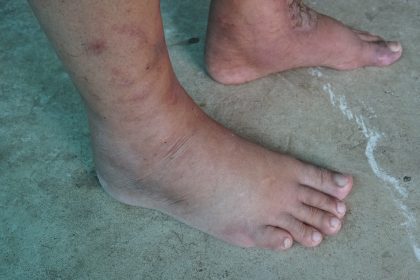While swollen feet often occur after prolonged standing or walking, persistent swelling might indicate underlying health conditions that require medical attention. Recognizing these warning signs early can lead to better treatment outcomes and improved health management.
Heart conditions and fluid retention
When the heart struggles to pump blood efficiently, fluid can accumulate in the lower extremities due to gravity. This condition, known as edema, often signals congestive heart failure. The swelling typically accompanies other symptoms such as shortness of breath, unusual fatigue, and irregular heartbeat patterns.
Early diagnosis makes a significant difference in managing heart conditions effectively. Medical evaluation becomes crucial when swelling persists or occurs alongside other cardiovascular symptoms.
Understanding kidney function
The kidneys serve as essential filters, removing waste and maintaining proper fluid balance throughout the body. When kidney function declines, excess fluid builds up, often manifesting as swollen feet and ankles. This swelling may indicate chronic kidney disease or other renal conditions.
Additional symptoms often include changes in urination patterns, unexplained nausea, and persistent fatigue. Regular medical check-ups help monitor kidney function and prevent further complications.
Liver health impact
Liver conditions, particularly cirrhosis, can cause fluid leakage into foot and leg tissues. The liver produces proteins that regulate blood and fluid levels throughout the body. When liver function becomes impaired, these regulatory processes break down, leading to noticeable swelling.
Other liver-related symptoms include jaundice, characterized by yellowing of the skin and eyes, abdominal discomfort, and changes in urine color. These signs warrant immediate medical evaluation to assess liver function and determine appropriate treatment.
Circulation and vein health
Venous insufficiency develops when leg veins struggle to return blood to the heart efficiently. This circulatory issue leads to blood pooling in lower extremities, causing persistent swelling and discomfort. Without proper treatment, the condition may progress to cause skin changes, varicose veins, and potential ulcer development.
Several factors increase risk for venous insufficiency:
- Extended periods of sitting or standing
- Excess body weight
- Family history of vein problems
- Previous blood clots or vein injuries
While compression stockings and regular movement help manage symptoms, proper medical evaluation ensures appropriate long-term care.
Lymphatic system disorders
The lymphatic system plays a vital role in removing waste and maintaining fluid balance. When this system becomes blocked or damaged, lymphedema can develop. This condition causes chronic swelling accompanied by tissue tightness, pain, and heaviness in affected areas.
Cancer treatments and surgeries involving lymph node removal increase lymphedema risk. Though not always curable, the condition responds well to targeted treatments including physical therapy, compression garments, and specialized exercises.
Recognizing serious symptoms
While occasional swelling after extended activity may be normal, certain signs indicate a need for medical attention:
Persistent swelling lasting beyond several days requires evaluation. Pay attention to accompanying symptoms such as pain, skin changes, or redness. Consider whether lifestyle factors like prolonged inactivity or high sodium intake contribute to the condition.
Managing swollen feet
Several strategies help reduce swelling discomfort while awaiting medical evaluation:
Elevate feet above heart level during rest periods to improve circulation. Maintain regular physical activity to prevent blood pooling. Consider wearing compression stockings for additional support. Monitor dietary sodium intake and maintain proper hydration.
Prevention and monitoring
Regular health monitoring plays a crucial role in managing foot swelling:
Track swelling patterns and note any changes in severity or accompanying symptoms. Maintain recommended check-ups with healthcare providers. Follow prescribed treatment plans consistently. Report any significant changes in swelling patterns promptly.
Taking action for better health
Persistent foot swelling often signals underlying health conditions requiring medical attention. Understanding potential causes helps identify when to seek professional evaluation. Early intervention typically leads to better outcomes and more effective condition management.
Proper attention to swollen feet contributes to overall health maintenance. Rather than dismissing this symptom, treat it as valuable information about your body’s well-being. Regular monitoring and appropriate medical care ensure optimal health management and prevent potential complications.
This story was created using AI technology.













